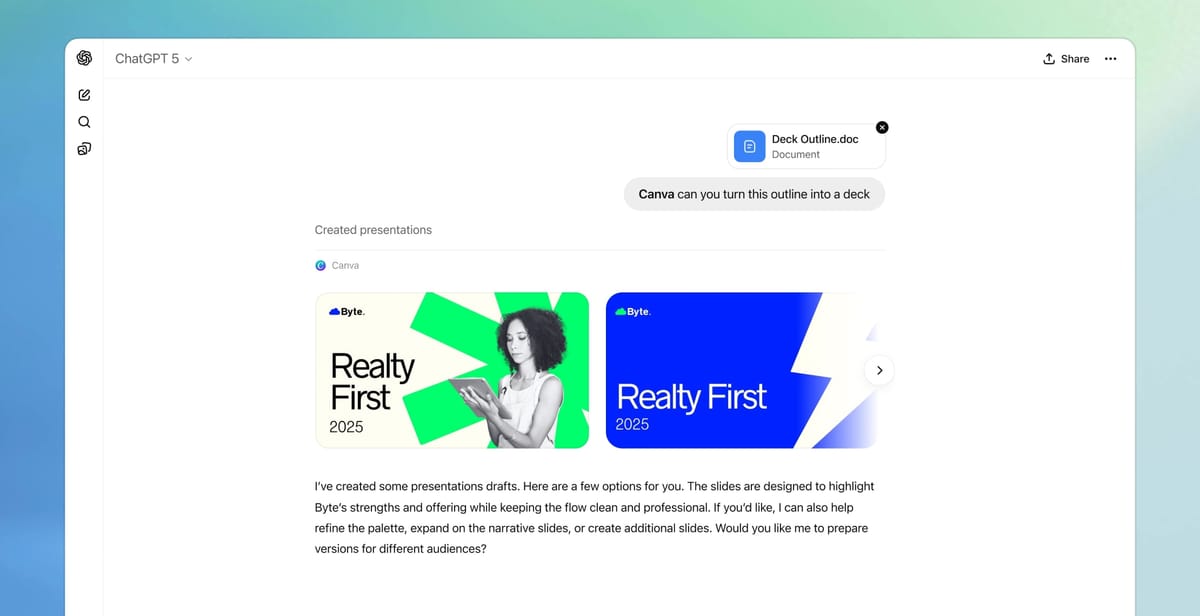
OpenAI unveiled tools at Dev Day 2025 that turn ChatGPT into something closer to an operating system than a chatbot. The Apps SDK gives developers direct access to 800 million weekly users through interactive applications that live inside conversations.
Key Points:
- Platform play: Apps SDK transforms ChatGPT from standalone tool into developer platform with embedded interactive interfaces
- Competitor's standard: OpenAI adopted MCP from Anthropic, signaling rare industry convergence on interoperability
- Distribution leverage: Seven launch partners (Spotify, Zillow, Canva, others) gain instant access to ChatGPT's massive user base
The calculus changed when OpenAI's product team realized people weren't just asking questions anymore—they were trying to complete tasks. Booking flights. Creating presentations. Finding homes. The traditional chatbot format kept breaking down at the moment someone needed to actually do something rather than just learn about it.
Apps in ChatGPT solve that friction by embedding rich interfaces directly into conversations. Instead of ChatGPT describing a Zillow listing in text, users now see an interactive map they can manipulate. Instead of suggesting song names for a playlist, Spotify's app lets you build and save one without leaving the chat window.
What makes this announcement noteworthy isn't just the feature—it's the architecture underneath. OpenAI built the Apps SDK on top of the Model Context Protocol, an open standard that Anthropic released less than a year ago.
MCP provides the plumbing: a standardized way for AI systems to connect with external tools and data. OpenAI extended it to handle both backend logic and frontend UI rendering, then released the full specification as open source. Apps built with the SDK can theoretically run anywhere that adopts the standard, not just inside ChatGPT.
The practical implication for developers is straightforward. Rather than building separate integrations for ChatGPT, Claude, and whatever comes next, they can write to a single protocol. That reduces the engineering overhead of maintaining multiple custom implementations.
Seven companies launched apps today: Booking.com, Canva, Coursera, Expedia, Figma, Spotify, and Zillow. Eleven more are coming later this year. These aren't startups testing experimental features—they're established platforms with millions of existing users. Their presence suggests confidence that ChatGPT's distribution is worth the integration work.
The discovery mechanism matters as much as the technical capabilities. Users can invoke apps explicitly by name ("Spotify, make a playlist") or ChatGPT can surface them contextually during conversations. If you're discussing home buying, Zillow appears. If you mention creating a presentation, Canva shows up. The model decides when an app is relevant and offers it as a suggestion.
This creates a new channel for user acquisition that doesn't depend on search engine rankings or app store placements. Developers who build compelling apps and get listed in ChatGPT's directory gain access to hundreds of millions of potential users at precisely the moment they're most likely to need that specific tool.
OpenAI plans to open app submissions for review later this year and promises monetization options including the Agentic Commerce Protocol—a system for instant checkout inside ChatGPT. Apps meeting basic guidelines will be listed in the directory. Those meeting higher standards for design and functionality will get featured placement, both in the directory and as suggestions during conversations.
The parallels to mobile app ecosystems are obvious, but the execution differs in important ways. Apps don't exist as standalone entities that users launch from a home screen. They're surfaced by AI inference during natural conversation, which means discovery depends less on marketing spend and more on how well the app solves problems the model recognizes users frequently encounter.
That creates an interesting dynamic. The best apps won't necessarily be those with the flashiest interfaces—they'll be the ones ChatGPT learns to recommend most often because they successfully complete user tasks. The model becomes the distribution layer, and its judgment about when to surface which app determines which developers succeed.
For companies already invested in OpenAI's ecosystem, the Apps SDK provides a clear path to deeper integration. For those on the fence, it offers a reason to commit engineering resources. And for ChatGPT users, it means the difference between a research tool and a workspace that can actually get things done.

